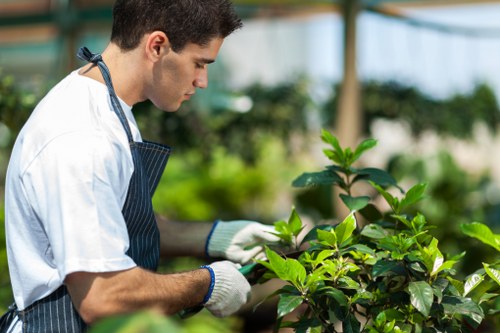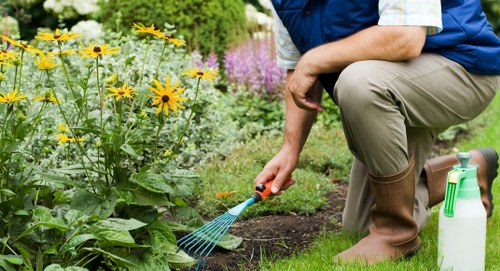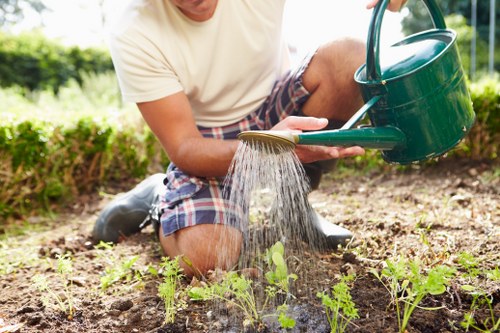Comprehensive Guide to Garden Maintenance in Highbury

Introduction to Garden Maintenance
Maintaining a beautiful garden in Highbury requires dedication, knowledge, and the right techniques. Whether you're a seasoned gardener or a beginner, understanding the unique aspects of garden care in this vibrant London locality can make all the difference.
Highbury’s climate and soil conditions present both opportunities and challenges for garden enthusiasts. By implementing effective maintenance strategies, you can ensure your garden thrives year-round.
In this guide, we’ll explore essential garden maintenance practices tailored to Highbury’s specific environment, helping you create and sustain a lush, vibrant outdoor space.

Understanding Highbury’s Climate
Weather Patterns
Highbury experiences a temperate maritime climate, characterized by mild winters and warm summers. This climate is conducive to a wide variety of plants, but it also means gardeners must be prepared for unexpected weather changes, such as sudden rainstorms or heatwaves.
Knowing the typical weather patterns helps in planning your garden maintenance schedule, ensuring that your plants receive the necessary care throughout the year.
Proactive measures, like installing proper drainage and selecting weather-resistant plants, can mitigate the impact of adverse weather conditions on your garden.

Soil Preparation and Health
Soil Testing
Healthy soil is the foundation of a thriving garden. Conducting regular soil tests in Highbury can help determine the pH levels and nutrient content, allowing you to make informed decisions about fertilization and soil amendments.
Amending the soil with organic matter, such as compost or manure, can improve its structure, enhance water retention, and provide essential nutrients to your plants.
Proper soil preparation not only supports plant growth but also promotes beneficial microbial activity, contributing to overall garden health.

Plant Selection and Care
Choosing the Right Plants
Selecting plants that are well-suited to Highbury’s climate and soil conditions is crucial for successful garden maintenance. Opt for native species or those known to thrive in similar environments to reduce the need for extensive care.
Consider factors such as light exposure, water requirements, and growth habits when choosing plants to ensure they complement each other and the overall garden design.
Regularly rotating plants and incorporating a diverse range of species can enhance biodiversity and reduce the risk of pest infestations.

Routine Maintenance Tasks
Pruning and Trimming
Regular pruning and trimming are essential for maintaining plant health and aesthetics. Removing dead or diseased branches encourages new growth and prevents the spread of infections.
Proper pruning techniques vary depending on the type of plant, so it’s important to familiarize yourself with the specific needs of each species in your garden.
In addition to health benefits, trimming helps shape plants, enhancing the overall appearance of your garden.
Weed Control
Preventing Weed Growth
Weeds compete with your garden plants for nutrients, water, and light, making effective weed control a priority in garden maintenance. Implementing preventive measures, such as mulching, can significantly reduce weed growth.
Hand-pulling and the use of natural herbicides are environmentally friendly methods to manage weeds without harming your desired plants.
Consistent monitoring and early intervention are key to keeping weeds at bay and maintaining a healthy garden environment.
Watering Strategies
Efficient Watering Techniques
Proper watering is vital for plant health, especially during the warmer months in Highbury. Utilizing efficient watering techniques, such as drip irrigation or soaker hoses, can conserve water while ensuring your plants receive adequate moisture.
Watering in the early morning or late evening reduces water loss due to evaporation and allows plants to absorb moisture more effectively.
Monitoring soil moisture levels helps prevent overwatering or underwatering, both of which can stress plants and hinder growth.
Fertilization Practices
Choosing the Right Fertilizers
Fertilizing your garden provides essential nutrients that support plant growth and development. Selecting the appropriate type of fertilizer, whether organic or synthetic, depends on your garden’s specific needs and your personal preferences.
Applying fertilizers at the right time and in the correct amounts prevents nutrient deficiencies and promotes healthy, vigorous plants.
Regular fertilization, combined with good soil management practices, ensures your garden remains lush and productive throughout the growing season.
Pest and Disease Management
Integrated Pest Management (IPM)
Managing pests and diseases is a critical aspect of garden maintenance in Highbury. Implementing an Integrated Pest Management (IPM) approach involves monitoring for pest activity, identifying pest species, and using a combination of biological, cultural, and chemical controls.
Encouraging beneficial insects, such as ladybugs and lacewings, can naturally reduce pest populations without the need for harmful pesticides.
Maintaining plant health through proper care practices makes your garden less susceptible to infestations and diseases.
Seasonal Maintenance Tips
Spring Garden Care
Spring is a time of renewal and growth in Highbury gardens. Start by clearing any debris from the winter months, pruning dead branches, and preparing soil beds for new plantings.
Planting early in the season allows your garden to take full advantage of the growing period, setting the stage for a vibrant summer.
Regular weeding and mulching in spring help establish a strong foundation for your garden’s health.
Summer Garden Care
During the summer months, focus on maintaining consistent watering schedules and providing adequate shade to prevent heat stress on plants. Regularly monitor for signs of pests and diseases, addressing issues promptly to keep your garden thriving.
Pruning and deadheading spent flowers encourage continuous blooming and maintain the aesthetic appeal of your garden.
Implementing proper irrigation techniques ensures your garden remains lush even during periods of intense heat.
Autumn Garden Care
Autumn is ideal for preparing your garden for the winter months. Clear away fallen leaves, prune trees and shrubs, and plant autumn-blooming flowers to extend the seasonal beauty of your garden.
Enriching the soil with compost or manure during autumn enhances its fertility, benefiting your plants in the following spring.
Protecting sensitive plants from the colder weather helps maintain garden health and ensures a strong start in the new growing season.
Winter Garden Care
Winter garden maintenance in Highbury involves protecting plants from frost and cold temperatures. Using mulch or frost covers can shield delicate plants from harsh weather conditions.
Resume regular maintenance tasks, such as pruning and planning garden layouts, once the threat of frost has passed.
Taking proactive measures during winter sets the stage for a successful and vibrant garden in the coming year.
Tools and Equipment for Garden Maintenance
Essential Gardening Tools
- Pruning Shears
- Garden Fork
- Spade and Shovel
- Rake
- Watering Can or Hose
Investing in high-quality gardening tools can make maintenance tasks easier and more efficient, ensuring your garden receives the best care possible.
Regularly cleaning and maintaining your tools prolongs their lifespan and effectiveness.
Hiring Professional Garden Maintenance Services in Highbury
Benefits of Professional Help
While DIY garden maintenance can be rewarding, hiring professional services in Highbury offers numerous benefits. Professionals bring expertise, experience, and specialized equipment to handle complex maintenance tasks efficiently.
Outsourcing garden care allows you to focus on enjoying your outdoor space without the stress of upkeep.
- Expert Plant Care
- Time Savings
- Customized Maintenance Plans
Professional gardeners can provide tailored solutions that enhance the beauty and health of your garden, ensuring it remains a source of pride and relaxation.
Eco-Friendly Garden Maintenance Practices
Sustainable Gardening Tips
Adopting eco-friendly maintenance practices not only benefits your garden but also contributes to environmental conservation. Incorporate sustainable methods such as composting, rainwater harvesting, and using organic fertilizers to minimize your garden’s ecological footprint.
Choosing native plants and encouraging biodiversity supports local ecosystems and promotes a balanced garden environment.
Implementing eco-friendly practices ensures your garden remains healthy and sustainable for years to come.
Conclusion
Effective garden maintenance in Highbury involves a combination of knowledge, planning, and consistent care. By understanding the local climate, preparing healthy soil, selecting appropriate plants, and implementing routine maintenance tasks, you can create a thriving and beautiful garden.
Whether you choose to manage your garden independently or enlist professional services, prioritizing garden health and sustainability will ensure your outdoor space remains a source of joy and relaxation.
Ready to transform your garden? Contact us today to book your garden maintenance service and take the first step towards a stunning Highbury garden.